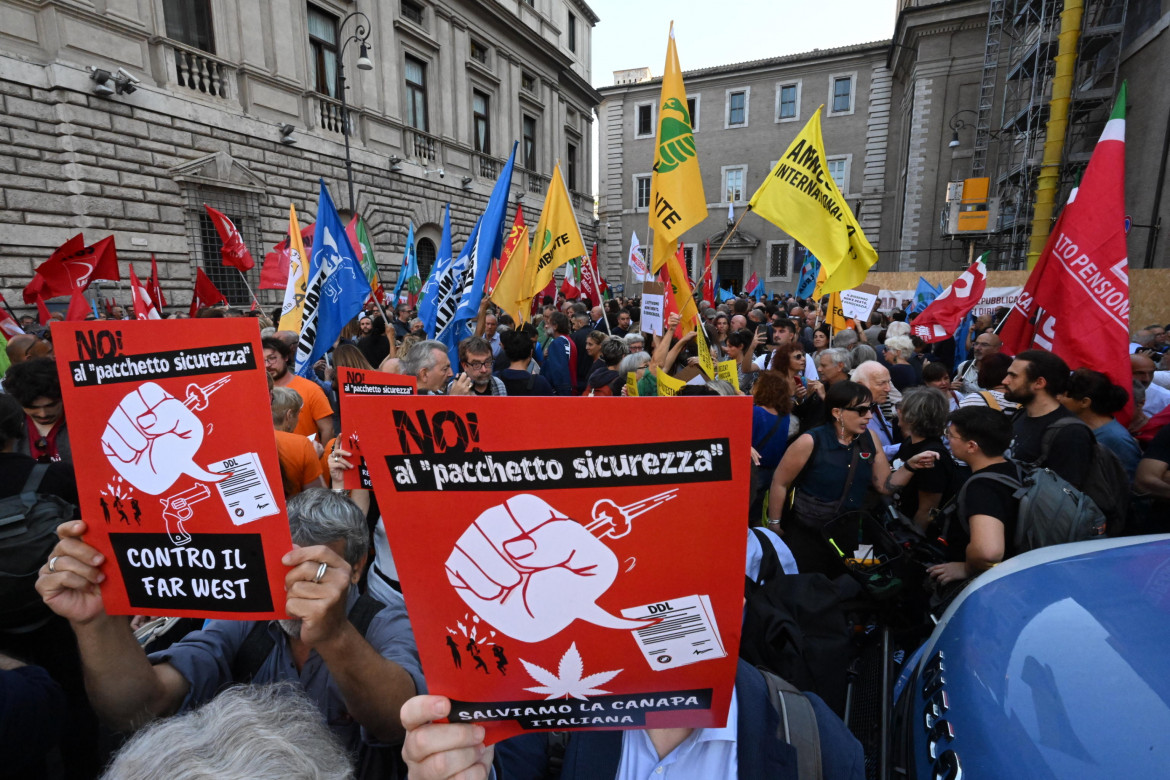Reportage
Mass protests against the ‘Security Bill’ reach the senate
‘When you go so far as to make dissent and the right to protest a criminal offense, the quality of democracy is in danger.’ Schlein pledges to fight the bill in parliament.

“March! March!” A hoarse voice, half-serious, half-joking, is calling for breaking the rules right from the start. Indeed, Piazza Visoni, a bend in Corso Vittorio just past Largo Argentina, is not nearly large enough to fit all the people who have come to protest the Security Bill.
The CGIL and UIL unions are present, but without their leaders, who are taking part in consultations with the government for the Structural Budget Plan. There are delegations from the opposition political forces with their leaders, and NGOs and social organizations that felt the impulse to unite and try to loosen the repressive pressure on dissent and all forms of life deemed incompatible with the vision of those currently in power.
Then, in a collective movement that can only feel liberating in these times, they get to experience the thrill of blocking the roadway as all move toward Piazza Navona, skirting Palazzo Madama [the seat of the Senate] and converging in front of its main gate facing Via della Posta Vecchia.
The hundreds of demonstrators who have gathered in Rome stop here, in tandem with the many who are protesting in front of the local prefectures in many cities across Italy, from Palermo to Milan.
Here we count our ranks and see each other face-to-face: both those who are here, those who are at another parallel protest and those who would like to be here and whose presence we feel beside us. Among the latter are the inmates of Rome's Rebibbia prison, from the Radio Rebibbia/Jailhouse rock radio station, who sent us a message saying that they also stand “against the anti-freedom bill they call the Security Bill.”
“We are taking part in the protest because the regulations affect us directly, with the repressive measures that are creating an increasingly inhumane prison system, where one will no longer even be able to refuse to carry out a wrongful order,” they say. “We’re taking part, and we’re also hoping that those who oppose the bill today will become aware of the fact that these anti-freedom measures are often first tried out in prisons – at which point they’re met with silence, if not with general support – and then are applied to all of society. Maybe the time has finally come to become aware of this.”
With the serene smile of someone who knows he is on the right side, Rome Municipio III councilman Luca Blasi shows up at the protest as well. He arrives hounded by the RT4 reporters with cameras that have been tailing him for days. They are the same ones who stoked the nonexistent “emergency” of occupied houses by showing some harmless old ladies who had gone to do their shopping, which set the stage for this Security Bill.
For days, they’ve been stalking Blasi at every step whenever he leaves his house. They’re doing so because he has publicly admitted that he lives in an occupied INPS-owned apartment that was supposed to be sold off on the market. They’re hoping he will lose his temper and make a scene so they have something to put on the air, but all they get is disappointment.
Young people from the Student Network stand at the front, chanting anti-fascist slogans and shouting “Freedom.” On the sides are those from Amnesty international, stressing that this is an alarm call for fundamental rights, while further behind, the political leaders promise that they will fight the bill in Parliament at every step.
Because, as Nicola Fratoianni says, “when you go so far as to make dissent and the right to protest a criminal offense, the quality of democracy is in danger.”
Giuseppe Conte says: “We have gone backwards even compared to the Rocco Code. Twenty new crimes have been introduced, obviously not against anyone in the political class, but against ordinary people.”
Riccardo Magi, of +Europa, says he is confident that the new crimes and more severe punishments introduced by Bill 1660 “will all be rejected by the courts and the Constitutional Court.” But, he adds, “it will take years, and in the meantime they will have done damage to citizens, increased conflict, raised social tension and also harmed businesses.”
Further on, we meet Elly Schlein: “We will fight the bill in Parliament,” she stresses. “But this strong social mobilization is also important.”
In the end, CGIL General Secretary Landini also makes it to the protest: “We do not support and we call for the withdrawal of the differentiated autonomy bill, the Security Bill and the restrictions on strikes being discussed in Parliament. These measures, taken together, are reducing people's freedom to exist,” he says.
The tug-of-war in the Senate has officially begun. The bill has gone to the Justice and Constitutional Affairs committees. According to the Senate President’s office, work on it will start on Tuesday.
The opposition senators are calling for an extensive round of hearings. At the protest, AVS group leader Peppe De Cristofaro explains: “Given the regressive nature of the regulations, we have asked that the committee hold in-depth hearings and that the majority not try any shortcuts. So, no priority on other measures or other procedural games to rush this through, since it is a bill, not a legislative decree that has a set deadline.”
One should recall that with the end-of-life law, the majority pushed up the number of hearings to 90. Now, the right says that’s too much and wants to limit the number of hearings to 50.
Originally published at https://ilmanifesto.it/la-protesta-no-ddl-sicurezza-arriva-al-senato on 2024-09-26
